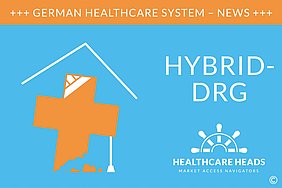Hybrid DRGs were already introduced in a pilot project by the German health insurance fund Techniker Krankenkasse in fall 2017. In 2021, the German government announced in its coalition agreement "Daring to Make More Progress" that it wanted to introduce hybrid DRGs for sector-specific reimbursement throughout Germany, which Federal Health Minister Karl Lauterbach personally reiterated on December 6, 2022, at the German Hospital Day as part of Medica. In fact, the corresponding law was passed promptly on December 8, 2022, with effect from January 1, 2023.
At this time, however, it was not yet clear how a hybrid DRG would be defined, calculated, and reimbursed. Therefore, the law gave the contracting parties of the self-government at federal level until March 31, 2023, to define the reimbursement components and the calculation methodology for hybrid DRGs. However, this failed.
As a result, the Federal Ministry of Health carried out substitute measure and put forward a so-called starter catalog of services per OPS codes to the Institute for the Hospital Reimbursement System (InEK). This defined the services for which a hybrid DRG was to be calculated. InEK calculated according to these specifications and the remuneration amounts were communicated by the BMG in the regulation.
However, numerous details were obviously not considered or regulated. More than a year after their legal introduction, still not all hybrid DRGs can be reimbursed. This means that those in-patient services can no longer be performed and reimbursed as before. This affects, for example, certain treatments for inguinal and other tissue hernias, various minor procedures on the urinary organs or ovaries, or arthrodesis (joint fusion, e.g. in the toe joint area).
Furthermore, no consideration was given to the fact, that cases are typically not only defined by a single OPS code but can have several OPS codes, leading to a well-known and typical phenomenon within the DRG system called "underpayment for additional services". This means that treatment cases like bilateral hernia interventions or recurrent hernias on one side receive less reimbursement.
Are you and your products affected by this?
Are you looking for ways to adjust reimbursement through hybrid DRGs?
An opportunity are proposals for the further development for the DRG system. Applications for 2024 can only be submitted until the end of February/end of March. You can find more information here.
If you have any questions on this topic, please contact us and we will be happy to support you.
Author: Healthcare Heads GmbH
Phone: +49 431 800 1470
E-Mail: info@healthcareheads.com


